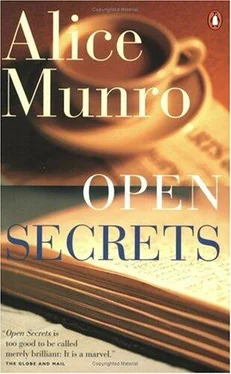“He was in the Army?” said a man Rhea knew — the man who shovelled the snow off the school sidewalks, through the winter.
“What made you think that? I never said that!”
“You said camp. Army camp,” said the snow-shoveller. His name was Dint Mason.
“I never said Army camp. I’m talking about lumber camp. Away up north in the Province of Quebec. What would an Army camp be doing up there?”
“I thought you said Army camp.”
“So somebody sees what he’s got. What’s that there? Well, he says, I don’t know. Where’d you pick it up? It was just laying around. Well, what do you think it is? Well, I don’t know.”
“Sounds a lot like asbestos,” said another man Rhea knew by sight, a former teacher, who now sold pots and pans for waterless cookery. He was a diabetic, and his condition was supposed to be so severe that he always had a drop of pure sugar, crystallized, at the end of his penis.
“Asbestos,” said the man who was telling the story, not pleased. “And on the spot they developed the biggest asbestos mine in the entire world. And from that mine came a fortune!”
Dint Mason spoke up again. “Not for the fellow that found it, I bet you it wasn’t. It never is. It never is a fortune for the fellows that found it.”
“It is sometimes,” said the man telling the story.
“Never is,” Dint said.
“Some have found gold and got the good of it,” the man telling the story insisted. “Plenty have! They’ve found gold and they’ve got to be millionaires. Billionaires. Sir Harry Oakes, for instance. He found it. He got to be a millionaire!”
“He got himself killed,” said a man who had not taken any part in the conversation till now. Dint Mason began to laugh and several others began to laugh, and the pots-and-pans man said, “Millionaires? Billionaires? What is it comes after billionaires?”
“Got himself killed, so that’s how he got the good of it!” Dint Mason cried at the highest pitch of the laughter. The man who had told the story brought his flat hands down and shook the table.
“I never said he didn’t! I never said he didn’t get killed! We aren’t talking here about whether he got killed! I said he found it, he got the good of it, he got to be a millionaire!”
Everybody had grabbed their bottles and glasses, to keep them from toppling. Even the men playing cards had stopped to laugh. Billy had his back to Rhea, his wide shoulders gleaming in a white shirt. His friend Wayne was standing at the other side of the table, watching the game. Wayne was the United Church minister’s son, from Bondi, a village not far from Carstairs. He had been at college with Billy, he was going to be a journalist — he already had a job, on a newspaper in Calgary. As the conversation about asbestos proceeded, he had looked up and caught Rhea’s eye, and from then on he watched her, with a slight, tight, persistent smile. This was not the first time Wayne had caught Rhea’s eye, but usually he didn’t smile. He would look at her and look away, sometimes when Billy was talking.
Mr. Monk pulled himself to his feet. Some illness or accident had crippled him — he walked with a stick, bent forward nearly at a right angle, from the waist. Sitting down, he looked almost normal. Standing up, he was tilted across the table, into the middle of the laughter.
The man who had told the story got up at the same time and, perhaps without meaning to, knocked his glass to the floor. It smashed, and the men began to shout, “Pay up! Pay up!”
“Pay next time,” said Mr. Monk, in a voice to settle everybody down — a large and genial voice for a man so wracked and dwindled.
“There’s not so many brains in this room as there is arseholes!” shouted the man who had told the story, treading on glass, kicking it aside, trotting past Rhea’s chair towards the back door. His hands were clenching and unclenching and his eyes were full of tears.
Mrs. Monk brought the broom.
Ordinarily, Rhea wouldn’t have been inside this house at all. She would have been sitting outside with Lucille, who was Wayne’s girl, in either Wayne’s car or Billy’s. Billy and Wayne would go in for one drink, promising to be out in half an hour. (This promise was not to be taken seriously.) But on this night — it was early in August — Lucille was at home sick, Billy and Rhea had gone to the dance in Walley by themselves and afterward they hadn’t parked, they had driven directly across country to Monk’s. Monk’s was on the edge of Carstairs, where Billy and Rhea lived. Billy lived in town, Rhea lived on the chicken farm just up over the bridge from this row of houses along the river.
When Billy saw Wayne’s car parked outside Monk’s, he greeted it as if it had been Wayne himself. “Ho-ho-ho! Wayne-the-boy!” he cried. “Beat us to it!” He gave Rhea’s shoulder a squeeze. “In we go,” he said. “You, too.”
Mrs. Monk opened the back door to them and Billy said, “See — I brought a neighbor of yours.” Mrs. Monk looked at Rhea as if Rhea were a stone on the road. Billy Doud had odd ideas about people. He lumped them together, if they were poor — what he would call poor — or “working class.” (Rhea knew that term only from books.) He lumped Rhea in with the Monks because she lived up the hill on the chicken farm — not understanding that her family didn’t consider themselves neighbors to the people in these houses, or that her father would never in his life have sat down to drink here.
Rhea had met Mrs. Monk on the road to town, but Mrs. Monk never spoke. Her dark, graying hair was coiled up at the back of her head, and she didn’t wear makeup. She had kept a slender figure, as not many women did in Carstairs. Her clothes were neat and plain, not particularly youthful but not what Rhea thought of as housewifely. She wore a checked skirt tonight and a short-sleeved yellow blouse. Her expression was always the same — not hostile, but grave and preoccupied, as if she had a familiar weight of disillusionment and worry.
She led Billy and Rhea into this room in the middle of the house. The men sitting at the table did not look up or take any notice of Billy until he pulled out a chair. There might have been some sort of rule about this. All ignored Rhea. Mrs. Monk lifted something out of the rocking chair and made a gesture for her to sit down.
“Get you a Coca-Cola?” she said.
The crinoline under Rhea’s lime-green dance dress made a noise like crackling straw as she sat down. She laughed apologetically, but Mrs. Monk had already turned away. The only person who took any notice of the noise was Wayne, who was just coming into the room from the front hall. He raised his black eyebrows in a comradely but incriminating way. She never knew whether Wayne liked her or not. Even when he danced with her, at the Walley Pavilion (he and Billy did an obligatory, one-time-a-night exchange of partners), he held her as if she were a package he was barely responsible for. He was a lifeless dancer.
He and Billy hadn’t taken notice of each other as they usually did, with a growl and a punch in the air. They were cautious and reserved in front of these older men.
Besides Dint Mason and the man who sold pots and pans, Rhea knew Mr. Martin from the dry cleaners’, and Mr. Boles the undertaker. Some of the others had familiar faces, and some didn’t. None of these men would be exactly in disgrace for coming here — Monk’s was not a disgraceful place. Yet it left a slight stain. It was mentioned as if it explained something. Even if a man flourished. “He goes to Monk’s.”
Mrs. Monk brought Rhea a Coca-Cola without a glass. It was not cold.
What Mrs. Monk had removed from the chair, to let Rhea sit down, was a pile of clothes that had been dampened and rolled up for ironing. So ironing went on here, ordinary housekeeping. Piecrust might be rolled out on that table. Meals were cooked — there was the woodstove, cold and spread with newspapers now, the coal-oil stove serving for summer. There was a smell of coal oil and damp plaster. Flood stains on the wallpaper. Barren tidiness, dark-green blinds pulled down to the windowsills. A tin curtain in one corner, probably concealing an old dumbwaiter.
Читать дальше












